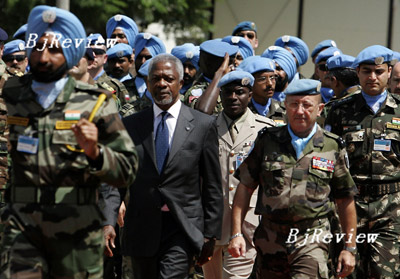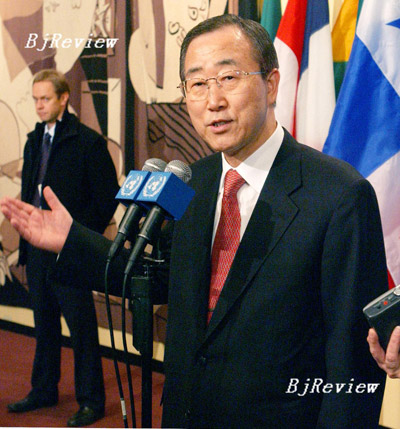
The United Nations moved into a new historical era when Ban Ki Moon took the reins of the world body at the start of the new year. In the years ahead, the international community will focus ever-closer attention on the organization.
It stands ready to watch how the new secretary general will steer the UN toward the ultimate goals enshrined in its charter. In particular, it is eager to see how the South Korean diplomat will deal with the problems in Asia and the world at large. The reform of the UN is also a top concern of its 192 member countries.
Many expectations have been placed on Ban. In short, he is expected to play important roles in the following six areas:
-- Checking unilateral actions that tend to marginalize the UN and making the most of the UN's collective security mechanism;
-- Safeguarding the UN Charter, helping to maintain the sovereignty and territorial integrity of all UN members, especially developing countries, and thus turning the UN Charter into a powerful legal screen;
-- Making unique contributions to UN peacekeeping missions;
-- Taking concrete steps to bridge the gap between developed countries and developing countries, reduce poverty and realize the Millennium Development Goals;
-- Promoting UN reform, which is currently at a crucial juncture, in a phased and rational manner; and
-- Enhancing the efficiency and integrity of UN agencies and their employees.
It is the sincere hope of the international community that the UN will take on an innovative and powerful new look while seeking to resolve the problems, disputes and conflicts haunting the world today.
Ban comes from Asia, and it is therefore natural that Asia places high hopes on him. It should be noted that Asia, with a large number of countries and a dense population, has greater diversity and complexity than any other continent. It is beset with a myriad of tough, complicated problems. Ban has already taken note of the nuclear issue in North Korea and Iran, the disputes between India and Pakistan over Kashmir and antiterrorism in Central Asia. These issues will certainly be on his agenda.

He recently told the media that he would give priority to resolving issues in the Middle East, including the conflict between Lebanon and Israel and the Palestinian issue. He said he would work to bring about substantial progress in the six-party talks aimed at ending the North Korean nuclear crisis. He will also appoint a special envoy on this issue.
Of course, it will be an uphill battle for Ban to resolve these issues in his five-year term. On the one hand, the problems are difficult to deal with as they all involve deep-rooted historical backgrounds and clashes of diverse interests. On the other hand, as the UN secretary general, he is supposed to find a point of convergence after balancing the interests of all countries instead of skewing in favor of a particular party.
Given these factors, great wisdom and diplomatic skills are required in order to reach his goals. When it comes to running the UN, anxiety about quick progress should give way to patience and a gradual approach, while vacillation should be replaced by perseverance.
Welcoming Ban shortly after his appointment, Kofi Annan, Ban's immediate predecessor, noted that more than 50 years ago, the first UN secretary general, Trygve Lie, greeted his successor, Dag Hammarskjold, by saying, "You are about to take over the most impossible job on Earth." And, while that might be true, Annan said he would add "this is also the best possible job on Earth."
While concentrating on regional and international hotspot issues, Ban is expected to carry on the UN reform conceived by his predecessors, including Annan. In other words, he should herald a new stage of the reform. In fact, he has indicated that he will address this matter at an appropriate time.
UN reform has profound implications. "This may be a moment no less decisive than 1945 itself, when the United Nations was founded," Annan told the UN General Assembly in 2003, calling for changes in the world body. The reform should consolidate the UN's status as the only and most authoritative intergovernmental organization in the world.
"Proliferation of the unilateral and lawless use of force," a concern of the former secretary general, should be prevented. The reform should ensure the UN's key role in addressing the problems resulting from globalization, especially in offering tangible aid to the least developed countries to lift them out of poverty. It should also improve the UN's competence in dealing with social problems derived from environmental degradation, drug trafficking, human trafficking, gender inequality and the spread of HIV/AIDS. The UN is expected to take effective and workable measures in this regard. With the reform, the UN Secretariat should become more streamlined, creative, efficient and clean.
To meet these expectations, major efforts should be committed to the reform of the Economic and Social Council and the Security Council.
The reform of the Economic and Social Council is the top priority of the UN reform. Close attention should be focused on making the council more relevant to the hotly contested international economic and financial issues. It should become more innovative so that it can come up with focused and practical resolutions.
The Security Council is at the very heart of the UN collective security mechanism. It is also the most authoritative and legitimate agency under this mechanism. Its reform will therefore have far-reaching repercussions. The following principles may be worth considering: expanding the council appropriately to achieve a regional balance and increasing the number of seats held by developing countries, especially African countries, to further enhance the UN's representation and authority. Various regional blocs can hold closed-door meetings to determine the candidates through democratic consultation. After that, a final decision can be made according to the provisions of the UN Charter.
With regard to the reform of the Secretariat, efforts should be made to downsize its personnel, shorten the period of the General Assembly session and highlight the priorities on the assembly's agenda. In this way, the Secretariat will become more capable of coping with all kinds of crises and emergencies. Corruption in the Secretariat and some peacekeeping missions should also be addressed.
The reform of the UN should be an all-inclusive, reasonable and gradual process. Given the notable disparities among its members and their different shares of interest, the reform must be highly democratic and transparent. The principle of democracy and the effective procedures that the UN has long practiced should be upheld so that the preset goals of the reform can materialize, thereby making the world body more powerful and authoritative.
How will Ban fulfill these challenging yet noble missions? He has indicated on several occasions that he believes in tai chi, or shadow boxing, a traditional soft-style martial art exercise. In his opinion, skills in tai chi can help in tackling many difficult issues. Tai chi embodies Eastern diplomatic wisdoms such as being gentle but firm, having perseverance and tenacity, making concessions to gain advantage and valuing "good timing" and "geographical convenience."
An experienced diplomat, Ban has made the most of these skills over the years in a productive manner. He is expected to continue to make remarkable progress in the next five years at the helm of the UN.
The author is a research fellow with the China Institute of International Studies
| 